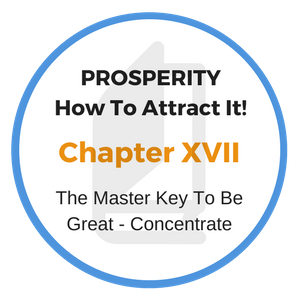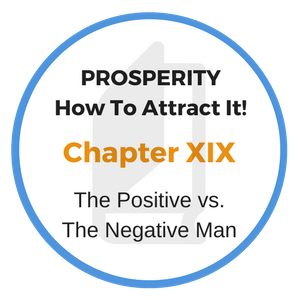- Home
- Self Growth Library
- Prosperity Chapter XVI
Prosperity Chapter XVI
Good Cheer And Prosperity
Prosperity Chapter XVI:
If I were asked to name the one thing that would help the human race more than any other, I would perhaps say, "More cheerfulness, — good cheer, keeping sweet under all circumstances."
More cheerfulness means more life, more happiness, more success, more efficiency, more character, a larger future. The cheerful man does not cramp his mind and take half views of things.
Have you never noticed that, as a rule, it is the cheerful, hopeful, optimistic people who succeed, and that it is the sour, morose, gloomy natures who fail or plod along in mediocrity, who never amount to anything? A habit of cheerfulness enables one to transmute apparent misfortunes into real blessings.
More cheerfulness will help you all along the line of life. It will help you to bear your burdens; it will help you to overcome obstacles; it will increase your courage, strengthen your initiative, make you more effective, more popular, more helpful. It will make you a happier, more successful man or woman; it will transform and beautify the humblest and homeliest surroundings.
Cheerfulness means poise, serenity, a sane, wholesome, well-balanced outlook on life. The cheerful man knows that there is much misery, but that misery need not be the rule of life.
There is no philosophy like cheerfulness. No one can estimate the healthful, uplifting power of one cheerful life, one serene, balanced soul. The hopeful, cheerful nature is constructive. He who has formed a habit of looking at the bright side of things has a great advantage over the chronic dyspeptic who sees no good in anything.
Shakespeare says:
"A merry heart goes all the day,
Your sad tires in a mile—a"
There is no other life habit which can give such prolific returns in happiness and satisfaction as that of being cheerful and sweet under all circumstances.
The cheerful man's thought sculptures his face into beauty and touches his manner with grace. Why not resolve that, whatever comes or does not come to you, whether you fail in your undertaking or succeed, you will keep cheerful, hopeful, optimistic, and be grateful for the good things that are yours?
In almost everything we can find some happiness if we look for it. The trouble with us is that we generally want more to make us happy than we deserve, and we are not grateful enough for the many things that are ours to enjoy.
How many of us might learn a lesson from the poor little girl living in the slums of a great city who took a prize at a flower show. When asked how she managed to raise her beautiful plant in the dark alley where her home was, she answered that there was a little space between two tall buildings through which a bit of sunshine came in, and that by moving the plant as the sun moved she had managed to keep it in the sunshine and to produce the prize flower.
We all have at least a little sunshine in our lives, something to be thankful for, and by turning our faces to it, we could manage somehow to keep growing, but we don't make the most of the little sun we do have, as the little girl did.
There is much that even the poorest of us might enjoy in the common, everyday life, if we would only now and then stop, look, listen, think and contemplate; if we would only try to see things in their true light, to hear the voices of Nature, to see the miracles going on about us on every hand in God's great laboratory. We could be happy in the most ordinary situations in life if we would only learn to delve down into the common things, to appreciate them, to see their marvelous beauty.
But no, it is always what we want, not what we have, that claims our attention. It's the far-away thing, it's tomorrow, next year, when we are better off, when we are a little better able to have luxuries, to have an automobile, to travel, then we'll enjoy ourselves and have a good time.
I know a man who, although very poor, can manage to get more comfort out of a real tough, discouraging situation than anyone else I have ever known. I have often seen him when he did not have a dollar to his name, with a wife to support, yet he was always buoyant, happy, cheerful, contented. He would even make fun out of an embarrassing situation; see something ludicrous in his poverty. He never was in a difficulty that blotted out the sun for him, for he always saw light ahead; and there is no doubt in my mind but that ultimately he will be a big success in his business.
If we are cheerful and contented all nature smiles with us; the air is balmier, the sky clearer, the earth has a brighter green, the trees have a richer foliage, the flowers are more fragrant, the birds sing more sweetly, and the sun, moon and stars are more beautiful.
Money itself has very little to do with happiness. Some of the most wretched men and women I have ever known anything about have been very rich. They could have everything that money could buy, but their money didn't bring them happiness; it didn't bring contentment or harmony into their homes. In fact, if many of these men and women had been poor, they would have been infinitely happier.
"Good cheer is one of man's greatest traits. It has helped him from giving up to despair even when starvation has stared him in the face and all mankind seemed against him."
- O.S. Marden
High-minded cheerfulness is found in great souls, self-poised and confident in their own heaven-aided powers.
Epictetus, the pagan philosopher, proved in his life the truth of his own words — "A man can be happy without wealth, without family, without office or honor, without health, without anything that the world seeks after." There are few of us lacking in all these things, but we are not happy because we are not normal as Epictetus was.
Multitudes of people think that happiness consists largely in getting rid of disagreeable things, disagreeable duties, in getting rid of the dry, dreary, routine of life, the compulsory drudgery: in getting rid of the responsibility of providing ways and means. They think they would be happy if they could only get freedom from the irksome things of life, the pinching, the hitching along from day to day, which comes from trying to do business on limited capital; freedom from duns, frets, and naggings; freedom from the thousand and one pricks and annoyances of the daily workaday life.
In short, most of us think we would surely be happy if we were released from the anxiety of the bread-and-butter question; if we did not have to think about the cost of things or the ways and means of getting them.
But, as far as we know, rich people are no happier than poor people. With them it is largely a question of shifting anxiety and worry to other things. The moment people get beyond the necessity of working, beyond anxiety about the cost of living, there are many other enemies of their happiness to creep into their lives and destroy their harmony — if they allow them.
The things which torment us, which keep us from being cheerful and happy are the boomerangs that come back to us from our wrong doing; all the mental wounds from which we suffer are self-inflicted. No human being can possibly injure another without injuring himself more. He cannot do wrong without paying for it in corresponding suffering. In a similar way our thoughts react upon our prosperity and happiness.
The new philosophy shows us that we do not have to die to come to our own, to reach our heaven, the heaven of our dreams, that the grave is not the portal of paradise, but that paradise is here and we are living in paradise but don't know it, because we can't see it, except as we get a glimpse of heaven shining through in all that is beautiful and sweet and lovely and kindly.
"The man who keeps his machinery well lubricated with love, goodwill and good cheer can withstand the hard jolts and disappointments of life infinitely better than the man who always looks on the dark side."
- Orison Swett Marden
Prosperity Chapter XVI , continued...
Paradise is gained by right living and right thinking, right acting, by practicing the God qualities. The philosophy teaches us that we can never awake in His likeness until we practice His qualities, the qualities which make up divinity. It teaches us that our consciousness of our oneness with the One is the source of all our strength, the source of all our power, the secret of all our success that is worth while," the source of our healing.
The new philosophy teaches us to face toward the light whether we can see the goal or not, always to look in the hopeful direction. It teaches us to look toward success, toward opulence, toward prosperity, no matter how poverty-stricken our environment seems.
It teaches us to look toward the perfect man that God planned, that God intended, not to see the sick or the diseased or the immoral, sinful, criminal or defective man. It teaches us that when we look at human beings through suspicious eyes, through distrusting eyes, through doubting eyes, through envious, jealous, or hatred eyes, we arouse in them, by an inevitable law, the very qualities which we hold in our mind, the qualities which we see in them. If we wish to appeal to the best, if we wish to draw the best out of others, we must look for the best in them; we must think the best of them; we must trust them; we must believe in them.
The man who smiles and sees the best in everything and everybody is the man who draws the best out of others. He attracts others and wins out in life, while the gloomy, sour face repels everyone.
"No smiles, no business," is the motto of a successful business house. At first this struck me as rather a peculiar motto, but on second thought, I realized how apt it is. Do we not all know that sour, gloomy faces drive away business, and that pleasant, sunny faces attract it? Cheerfulness will attract more customers, sell more goods, do more business with less wear and tear than any other quality.
Nobody but himself may be helped by the money millionaire, but everybody is enriched who knows or comes in contact with the millionaire of good cheer, and the more he gives of his wealth the more it multiplies.
Andrew Carnegie owed his popularity and much of his success and happiness to his cheerful disposition. In his later years he said: "My young partners do the work and I do the laughing, and I commend to you the thought that there is very little success where there is little laughter."
Whoever strikes the keynote of joy and happiness is a dispenser of the balm of Gilead, of a healing force. A man without cheerfulness is a sick man. The sadness of his spirit lays a withering blight on all the beauty of his life. He becomes prematurely old. His strength decays. "A broken spirit drieth up the bones."
But cheerfulness is a medicine. It promotes health. The habit of cheerfulness lubricates the human machine and very greatly increases and sharpens every one of the mental faculties. It improves every function of the body. Cheerfulness keeps one young; it is one of the secrets of eternal youth.
One who admits to himself and others that he is sick is indeed sick; but one who declines to make such admission, and cheerfully goes on as if he were well, conquers many an ailment, which if he had succumbed to it, might have proved serious.
Beecher used to speak of sunny natures who moved through the world like cheering music, spreading joy and gladness wherever they went. We have all met rare souls who live in the sunlight all the time. No matter how poor they may be in worldly goods they see something in life to be thankful for. They are always helpful, hopeful, encouraging, happy. Wherever they go they scatter sunshine.
If we cannot always so control our moods as to be really happy we can always appear cheerful. This is a duty we owe society and ourselves. It is weak and cheap to go about radiating mental poison, the poison of discouragement, of gloom; the poison of worry and anxiety. It is weak to go about the world wearing mourning in our expression. It is a sin to peddle gloom and despondency. We owe it to the world and to ourselves to scatter sunshine, to appear at our best, not at our worst.
There is significance in the fact that man is the only animal that has a sense of humor — that can laugh. The Creator meant us to have fun; to rejoice and be glad always. Happiness is man's birthright. Laughter is a token of saneness. Abnormal people, insane people, seldom laugh. It is as natural to a normal human being to want to laugh and have a good time as it is to breathe. There is something wrong about a person who never laughs, who is always serious. Things which amuse and make us enjoy life have a healthful physical and moral influence.
The happiness habit is just as necessary to our best welfare, to any success that is worth the name, as the work habit, or the honesty habit, or the square-dealing habit. We can cultivate the habit of being cheerful and happy just as we can cultivate the habit of being polite to every one with whom we come in contact.
Anything that will make a man feel joyous and happy, that will clear the cobwebs of discouragement from his brain and drive away fear, care, and worry, is of practical value and should be encouraged. Innocent, hearty fun will do this as nothing else can. It is the shrewdest kind of business policy to do what will recreate, refresh, and rejuvenate one for the next day's work. Then why not have a lot of fun and laughter in the home?
One of the greatest sins multitudes of parents commit against their children is suppressing their love of play in the home. Many parents insist that their children must not talk or laugh at meals. This is a crime against childhood. It is actually unfitting them to be pleasant and agreeable companions, "good mixers" when they grow up and go out in the world, for the habits of childhood become a part of the grown man and woman.
Fun is as necessary as bread. He makes a mistake who regards laughter and humor as transitory, superficial things that pass away and leave nothing behind. They have a permanent, beneficial influence on the whole character and career.
Having a good time should be a part of our daily program. Why should this not enter into our life-plan? Why should we be serious and gloomy over our work, over our meals? Why not do everything with joy and gladness?
Cheerfulness will help you all along the line of life. It will help you bear your burdens; it will help you to overcome obstacles; it will increase your courage, strengthen your initiative and make you more effective. It will not only make you a happier, but also a more successful and progressive man. Cheerfulness, more joy in the life, is our greatest need.
"When a man chooses good cheer for his companion he never talks of hard times or carries a picture of poverty or want in his mind."
Struggles, disappointments, difficulties are not meant to make us sad, but to make us strong — for if we do not whine and complain, we shall be given strength to overcome all these.
The cheerful man sees that everywhere the good outbalances the bad, and that every evil has its compensating balm.
Robert Louis Stevenson said, "A happy man or woman is a better thing to find than a five-pound note. He or she is a radiating focus of good will and their entrance into a room is as though another candle had been lighted."
We were all made for happiness, to rejoice and be exceeding glad. Any inharmony or discord in our nature is contrary to divine law and divine will. It was the Creator's intention that everybody should be happier than the happiest beings are today.
If you, my friend, have not found that source of happiness which will keep you in poise and serenity, no matter what may happen to you or yours, if you have not found that poise which gives the peace that provides understanding under all conditions, you have not yet found the great secret of life.
You have yet to learn that real enjoyment, real satisfaction does not come from the possession of things, does not come from outside sources, but that our highest satisfaction, our highest enjoyment, our highest happiness, ever comes from within. Here is the fountain of all supply; here is where we touch God, the Source of all good; here is where we tap the divinity in the great within of us.
If your supply is limited and you feel unhappy, dissatisfied, gloomy, you may be sure that there is something wrong inside of you. There is something wrong in your thought, in your motive, in your acts, something wrong in your view of life. You are violating your nature in some way or you are not using your powers rightly.






